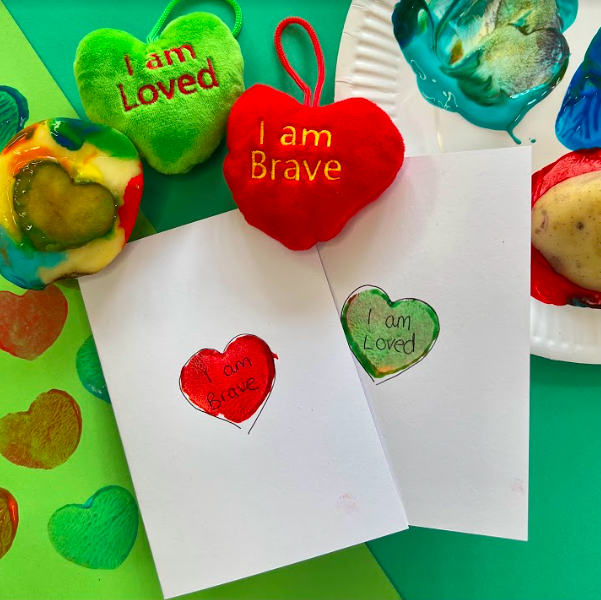Talking to children about serious illness or someone passing away can be very hard. As adults at these times, we can be grief-stricken ourselves or in disbelief and shock, let alone be able to explain the situations to a child. We usually want to protect children as much as we can.
When you look back on your life, I bet some things happened to you that left you with some of the feelings and sadness associated with grief. Like a teacher you liked leaving your school, a friend moving away, or maybe an animal dying in the family. Over time most of us become familiar with some of these deep emotions. They (these emotions?) can continue with family separations and other changes in our life as we grow up. As hard as it is for children, it is life, and learning about emotions will help them throughout their life.
Building resilience and self-worth in children within a safe and protective environment is crucial to supporting them in difficult times. We know it will not save children from the heartache of loss, but it will give them the tools and strength to cope with their emotions and get through it. Their attitudes, understanding, optimism, and how they learn to communicate with others will help them tremendously.
So how do you talk to a child about the subject of loss?
We encourage parents and carers to be available, open, and honest with their children and consider their age and the stage of their development. Openness helps to give a child a strong sense of security in the long run.
When sharing information with a child, try to be short and clear, as too much information can overwhelm them. Children are known to ask WHY! Curiosity comes naturally. Begin slowly with basic information, and give the child space to think, feel, and process. Sometimes that is enough in that moment. Children will come to you when they are ready for more information.
Assess the child’s ability to cope and go at their pace. If you were to say, I need to talk to you about something, Uncle Jack is sick, and he is in hospital, that may be all they can deal with at that time. They may appear OK, need some comfort, or go off and play. There is no right or wrong way of doing this. You know your child best and how they process things. Go with your gut feeling and feel your way.
Do not be afraid to show your emotions to children. Children must learn that we all find these times difficult, and it is normal to get upset. Tell them about your feelings and what helps you, crying, a hug, talking, or time alone. Teach children that feelings come and go and that it is good to talk about them.
Some families find it difficult to talk about feelings, and children left with their imaginations can make up their own stories. If a parent leaves the family home, they may believe it is their fault or that the parent does not love them anymore. If someone dies, they could be left devastated, wondering if they were to blame. Without information and emotional support, it could affect their self-worth and mental health. These issues can lead to anxiety, a lack of trust, and a belief that people are not there for them. It can also cause behavior problems and unhealthy coping mechanisms as they grow older.
Although it can be difficult, talking and listening to your child is paramount. You need to know their level of understanding, perspective, and how they feel about the situation. You can comfort and support your child as you work through grief together. You can reassure them and help them to connect to times when they felt sad before and help them to remember that their feelings passed with time, and they were OK. Remember when!
We usually want to make sense of loss and our emotions to help calm our nervous system. Encouraging children to talk and share their feelings, and accept their emotions, can help their grieving process. If your child does not want to talk, give them time and regularly check in with them. Ask them if they are OK and if they have any questions. During this time, your child could become clingy and fear something will happen to them or you. You may also see changes in their behavior, acting out, quiet, sleep issues, etc. It is all normal and will pass. Children can find it hard to cope with their feelings or explain what they are.
Some families explain death through religious beliefs. Others believe that the person is always watching over them or that they have gone altogether. This is more personal to each individual family.
Be prepared for the Why! How! Questions.
When someone has died, in time, you can do things together to remember the person. You can plant something in a garden, go to their special place, or make a box with the child and keep special items in it as reminders of the person. Things like photos and other keepsakes. Items and reminders to support feelings and memory in the future. Emotions can also rise again around anniversary dates or birthdays. If you are aware, it will not feel like things are going backward.
What we are talking about here with loss is not too different from other areas we have discussed, areas like:
- Always encourage open communication in the home about feelings and emotions and explain at the child’s level of understanding and stage of development.
- If children have difficulty explaining their feelings, describe what you see, and ask them if you are right.
- Acknowledge and validate feelings.
- Role model how to express feelings
- Use I message statements, I feel………when…………
- Use the sliding scale to ask a child how they are feeling. On a scale of 1 to 10, 10 being the worsted. If they say 7 or 8, acknowledge and comfort. Ask again tomorrow and if they say 5 or 6, help them assess their emotions and see that things are improving. If the number stays the same, ask them what they think would bring it down to 6. They may say a hug etc.
- If your child finds it difficult to talk face to face, don’t forget the importance of play. Children act out situations with their toys, tell stories and share their feelings. Painting or drawing can also help in the same way. Ask them questions about what you see to extend the conversation.
- Tell children what’s happened in a safe place where they can feel safe and secure, not in their bedroom, as this could be a place of comfort for them the rest of the time and could change sleep patterns, etc.
- Have their comfort toys around them.
- Give small amounts of information and be led by the child. They will ask you if they want more information.
- Listen to get your child’s perspective and emotions about the situation.
- Don’t be afraid to say I don’t know.
- Don’t hide your feelings, as you may give the child the wrong message. We don’t talk about these things, or we don’t show our feelings.
- Give support, comfort, and reassurance, and tell them you love them.
- Tell them that you will get through it together and that feelings don’t stay the same.
- Explain death simply with things like their heart stopped working.
- Find out what their needs are.
- Try not to let your anxieties and emotions affect your child by asking them questions all the time. Try to relax with them.
Activity for helping children with loss
Help a child decorate or cover a box like a shoe box and keep photographs and keepsakes inside, items, and memories of the person.
The child can go to the box when they need to feel connection and comfort.
Over time if grief becomes complicated and your child is having issues with going to school, sleeping, or in any other way, there are bereavement and counselling services you can contact for support.




